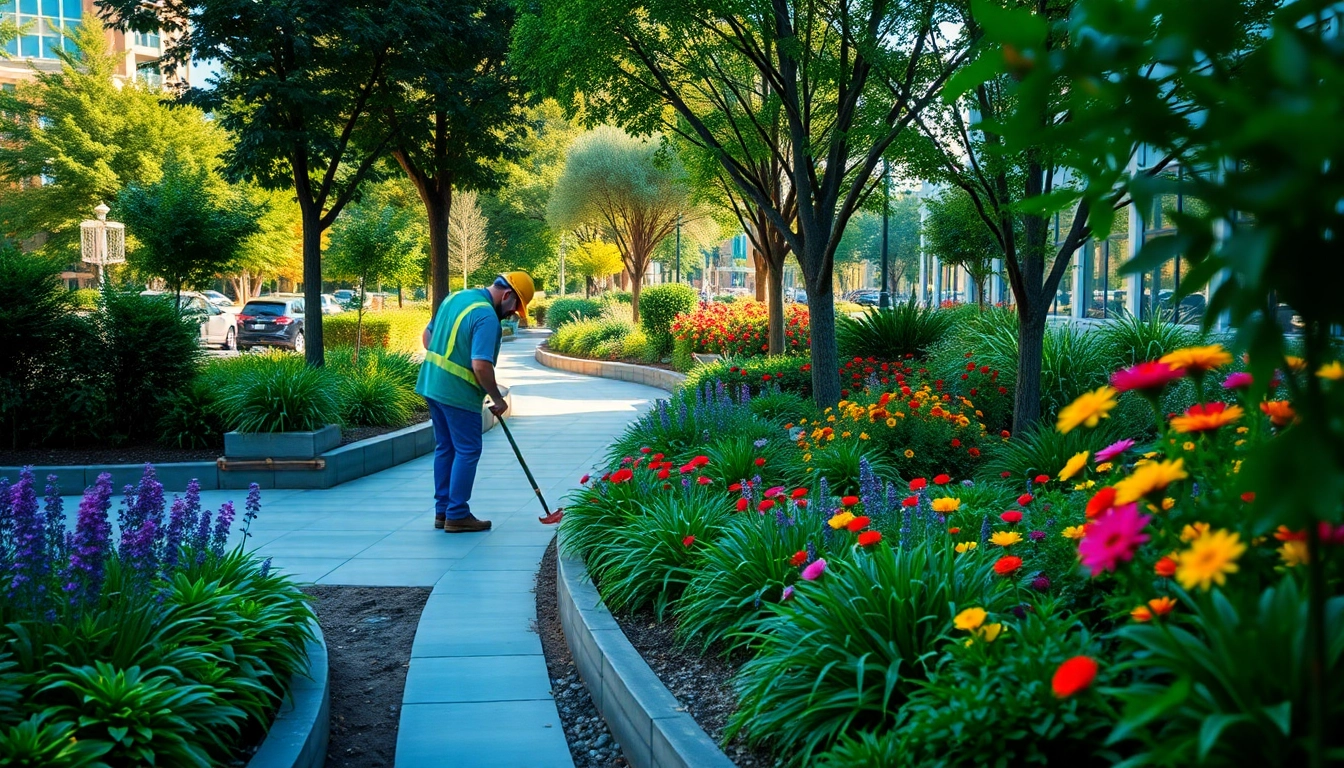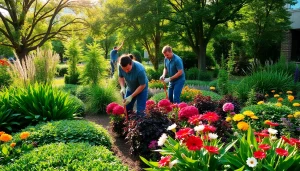Understanding the Role of Commercial Landscaping Contractors
What They Do and Why You Need Them
Commercial landscaping contractors play a vital role in enhancing the aesthetic appeal and functionality of outdoor spaces for businesses. Their expertise goes beyond simple maintenance; they design, install, and maintain landscapes that reflect the identity of a business while ensuring environmental sustainability. Engaging commercial landscaping contractors can transform mundane exteriors into vibrant spaces that attract customers and boost property value. They understand the nuances of landscape architecture, allowing them to design sites that not only look impressive but are practical for day-to-day operations.
These professionals assess the unique requirements of each client, considering factors such as local climate, geography, and business objectives, to create a tailored landscape plan. Whether it’s creating a welcoming entrance, maximizing outdoor seating capacity for restaurants, or designing functional green spaces for employee well-being, their work is crucial for the overall success of a business.
Key Services Offered by Landscaping Contractors
When it comes to commercial landscaping, contractors offer a wide array of services that address different aspects of the landscaping process:
- Landscape Design: This involves creating detailed plans for creating outdoor spaces, which may include planting design, hardscaping, and layout considerations.
- Installation and Planting: Contractors manage the installation of all landscape elements, including trees, shrubs, flowers, irrigation systems, and hardscape features like patios and pathways.
- Maintenance Services: Regular upkeep, including lawn care, seasonal planting, pruning, and pest management, ensures that the landscape remains healthy and visually appealing.
- Irrigation Services: Effective watering systems are essential, and contractors design and install irrigation solutions that conserve water while ensuring plant health.
- Site Preparation: This includes grading, soil amendment, and other tasks that prepare a site for landscaping installation.
- Consultation Services: Some contractors provide expert advice on landscape installation and maintenance, ensuring clients make informed decisions.
By offering these comprehensive services, commercial landscaping contractors help businesses create outdoor environments that enhance brand identity and customer experience.
How to Choose the Right Contractor for Your Project
Selecting the right commercial landscaping contractor is crucial for the success of any landscaping project. Here are several factors to consider:
- Experience and Reputation: Research potential contractors’ past projects and client reviews to gauge their reliability and quality of work.
- Portfolio of Work: A well-curated portfolio can indicate a contractor’s versatility and creativity. Look for projects similar to yours.
- Licensing and Insurance: Ensure the contractor is properly licensed and insured to protect yourself from potential liabilities.
- Communication Skills: A contractor should communicate effectively and be open to discussing ideas and feedback throughout the process.
- Detailed Proposal: A comprehensive proposal that includes costs, timelines, and materials shows professionalism and thoroughness.
- Sustainability Practices: If eco-friendliness is important to your business’s ethos, inquire about the contractor’s sustainable practices.
Taking the time to carefully select a contractor can save you from headaches down the line and ensure your vision is executed correctly.
Top Trends in Commercial Landscaping
Eco-Friendly Landscaping Solutions
More businesses are embracing eco-friendly practices and sustainability in their landscaping efforts. Eco-friendly landscaping includes using native plants that require less water and pesticides, implementing xeriscaping techniques to conserve water, and incorporating organic fertilizers. Some contractors specialize in sustainable landscape design, which includes creating landscapes that support local wildlife and encourage ecological balance.
Implementing green roofs and walls is another way businesses are enhancing their outdoor spaces while promoting biodiversity. These features not only improve energy efficiency but also create attractive and functional outdoor spaces.
Incorporating Smart Technology in Landscaping
The integration of smart technology into landscaping is rapidly gaining traction. From automated irrigation systems that adjust watering schedules based on weather forecasts to smart lighting solutions that enhance security while improving aesthetics, technology is transforming landscape management. Many contractors now offer smart landscaping solutions that can be monitored and controlled via mobile apps, ensuring that landscapes are not only beautiful but also efficient.
Moreover, the use of drones for surveying land and assessing the health of plants can streamline workflows and provide high-quality data to contractors.
Designing Sustainable Outdoor Spaces
Sustainability in commercial landscaping is about more than just being environmentally friendly; it also encompasses creating spaces that improve the quality of life for both employees and visitors. This includes designing outdoor areas with elements that promote relaxation and collaboration, such as green spaces, seating areas, and walking paths. Utilizing permeable paving materials helps manage stormwater runoff, contributing to environmental health.
Additionally, incorporating local flora serves not only ecological purposes but also creates a unique landscape that reflects the local environment’s identity.
Cost Factors to Consider in Landscaping Projects
Budgeting for Professional Landscaping Services
Budgeting for landscaping services can be challenging, particularly for larger commercial projects. It’s essential to clearly define your goals and priorities before discussing costs with contractors. Basic landscaping services such as planting and maintenance will have different price points compared to custom designs or installations of specific features like water fountains or hardscapes.
When budgeting, consider not only the initial costs but also the long-term maintenance expenses associated with the landscape design. A more complex design might look appealing; however, it could lead to higher maintenance costs over time.
Estimating Costs of Different Landscaping Elements
Understanding the various costs associated with landscaping elements can help you create a realistic budget. Key cost considerations include:
- Plant Materials: The type and quantity of plants can significantly impact your budget. Opting for native plants may save costs in the long run due to their lower water and maintenance needs.
- Hardscaping Features: Patios, walkways, and retaining walls require materials like stone, brick, or concrete, which can vary greatly in price based on source and installation complexity.
- Irrigation Systems: The installation of a sprinkler system or drip irrigation can involve upfront costs, but they often pay off through reduced water usage.
- Soil Preparation and Drainage Solutions: Ensure that you budget for necessary soil amendments, grading, and drainage solutions to ensure the health of your landscape.
Getting the Best ROI from Your Landscaping Investment
Investing in commercial landscaping is a long-term commitment, and businesses should aim for a high return on investment (ROI). To achieve this, prioritize durable, low-maintenance landscape designs that enhance the property’s aesthetic appeal while minimizing upkeep costs. Investing in quality materials and designs can pay dividends in terms of employee productivity and customer attraction.
Conducting periodic assessments to evaluate the landscape’s performance can help identify areas for improvement, ensuring that your investment continues to yield positive results over time.
Case Studies of Successful Commercial Landscaping Projects
Highlighting Innovative Designs Across Various Sectors
Examining case studies provides insight into how effective commercial landscaping can transform spaces. For instance, a successful redesign of a corporate campus created a series of interconnected walking paths, outdoor meeting areas, and sustainable gardens that not only beautified the property but also provided employees a place to connect with nature. Similarly, a retail chain invested in an attractive entrance garden that led to increased foot traffic and sales during warmer months.
Before-and-After Comparisons to Showcase Impact
Case studies that include before-and-after photos highlight the transformative potential of professional landscaping. A local hotel revamped its courtyard area by introducing native plants and seating, resulting in increased guest satisfaction and extended outdoor usage. Such comparisons clearly illustrate the value and benefits that landscaping can offer to commercial properties.
Client Testimonials and Satisfaction Metrics
Listening to client testimonials provides qualitative evidence of a contractor’s abilities. Many business owners recount how hiring a professional landscaping contractor not only improved their property’s aesthetics but also led to measurable increases in customer engagement and employee satisfaction. One restaurant owner noted a 20% increase in diners choosing to eat outside due to the appealing atmosphere created by their landscaping project.
Maintaining Your Landscape: Best Practices
Seasonal Maintenance Tips from Landscaping Experts
Maintaining a commercial landscape requires seasonal attention to ensure the longevity of the design. Experts recommend conducting seasonal clean-ups in spring and fall to address debris, dead plants, and general upkeep. Regular watering during hot months can be optimized by adjusting irrigation schedules according to rainfall.
It’s also beneficial to mulch garden beds to retain moisture and suppress weeds while providing an attractive finished look in summer.
Long-Term Care Strategies for Landscaping Projects
A proactive approach to long-term care involves scheduling regular inspections and employing preventive measures. This includes monitoring plant health, regular pruning, and evaluating hardscape elements for wear and damage. Establishing a partnership with your landscaping contractor ensures you receive timely support and expert advice tailored to your unique landscape.
How to Partner with Contractors for Year-Round Maintenance
Creating a partnership with your landscaping contractor for year-round maintenance can provide ongoing oversight and expertise. Developing a maintenance schedule that outlines responsibilities—like seasonal plant rotation and irrigation system checks—will help keep your landscape thriving throughout the year. Regular communication regarding budget adjustments, design changes, or new landscaping trends can ensure your outdoor space remains attractive and functional.








